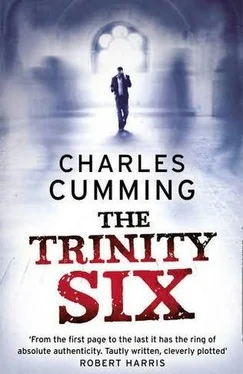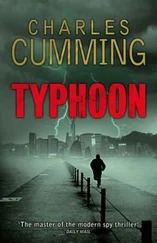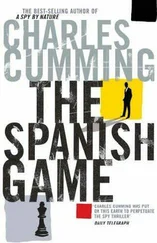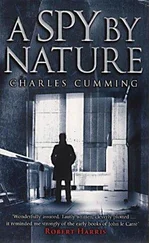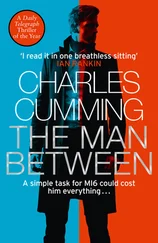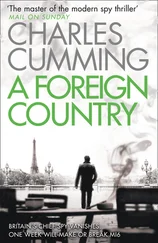Charles Cumming - The Trinity Six
Здесь есть возможность читать онлайн «Charles Cumming - The Trinity Six» — ознакомительный отрывок электронной книги совершенно бесплатно, а после прочтения отрывка купить полную версию. В некоторых случаях можно слушать аудио, скачать через торрент в формате fb2 и присутствует краткое содержание. Жанр: Шпионский детектив, на английском языке. Описание произведения, (предисловие) а так же отзывы посетителей доступны на портале библиотеки ЛибКат.
- Название:The Trinity Six
- Автор:
- Жанр:
- Год:неизвестен
- ISBN:нет данных
- Рейтинг книги:5 / 5. Голосов: 1
-
Избранное:Добавить в избранное
- Отзывы:
-
Ваша оценка:
- 100
- 1
- 2
- 3
- 4
- 5
The Trinity Six: краткое содержание, описание и аннотация
Предлагаем к чтению аннотацию, описание, краткое содержание или предисловие (зависит от того, что написал сам автор книги «The Trinity Six»). Если вы не нашли необходимую информацию о книге — напишите в комментариях, мы постараемся отыскать её.
The Trinity Six — читать онлайн ознакомительный отрывок
Ниже представлен текст книги, разбитый по страницам. Система сохранения места последней прочитанной страницы, позволяет с удобством читать онлайн бесплатно книгу «The Trinity Six», без необходимости каждый раз заново искать на чём Вы остановились. Поставьте закладку, и сможете в любой момент перейти на страницу, на которой закончили чтение.
Интервал:
Закладка:
‘What guarantees do I have that you have the kind of information I’m looking for?’
Somers paused. He picked up the pen and began tapping it on the desk. Somebody walked past the office, whistling the theme tune to EastEnders.
‘Oh, I’ve got the information you’re looking for,’ he said. ‘You see, I know about St Mary’s Paddington. I know what that nice MI6 did to Mr Edward Crane.’
Chapter 9
Curry Night-Wednesday
Gaddis was staring at the poster tacked up on the wall of the pub in West Hyde. The jukebox had shifted to a song he didn’t recognize, an anti-melodic squawk run through software and drum machines. Somers had gone to the Gents again, his second visit inside half an hour. Was he nervous, or had the peanuts disagreed with him? Gaddis didn’t much care either way.
Seven hours earlier, in a trance of determination to find out what Somers knew, he had called for a taxi and driven from Mount Vernon Hospital to a supermarket three miles up the road. At a cash machine he had withdrawn?1000 on three separate cards, maxing out his current account, putting?400 on his already debt-ridden Visa bill, and, to his shame, making up the difference with?100 from an account set up in Min’s name which contained Christening money given to her by her godparents. That had been an absolute low-point and he promised himself that he would put?500 back in the account as soon as he received the signature advance on the book.
As arranged, Somers had been waiting for him in the car park. Gaddis had handed over the cash, along with a post-dated cheque for 2000. He had then accompanied Somers on their damp, enlightening walk along the banks of the Grand Union Canal.
This is what he now knew. That in February 1992, Sir John Brennan, currently the head of the Secret Intelligence Service, had bribed four people to fake the death of Edward Anthony Crane, a former Foreign Office diplomat prominent enough to earn an obituary — albeit one that had been faked — in The Times. Crane was now almost certainly living under an assumed name in some FCO variant of the Witness Protection Programme, his whereabouts known only to Brennan and certain privileged members of MI6.
‘So who do you think he was?’ he asked Somers. ‘Why do you think it was necessary to kill him?’
‘Search me.’
Gaddis had put the questions as a means of discovering what, if anything, Somers had subsequently discovered about Crane’s identity.
‘You never looked into it? You never saw Brennan again?’
‘Haven’t we been over this?’ Somers picked up his pint and drained it. In the bathroom, he had swept his hair back with the assistance of a little water; the collar of his shirt had become soft and wet as a result. ‘Like I said, all I know is that MI6 was prepared to fake someone’s death. So I conclude from this that the person involved must have been important, right? You see, I’ve been a nurse for over fifteen years, Professor. I’ve met a lot of other nurses. And when we get together, at the Christmas party, say, or a leaving do, it’s surprising how rarely we talk about being asked to pretend that someone’s dead. It’s not a daily occurrence. It’s not something we’re trained for. In fact, the departure of Edward Crane from planet Earth is probably the only time in the long and distinguished history of the National Health Service that something like that has ever happened.’
‘Drink?’ Far from annoying him, the speech had reassured Gaddis that Somers knew nothing about Crane’s link to the Cambridge spies.
‘What?’
‘I said, do you want another drink, Calvin? My round.’
Somers looked at his watch. The strap was worn, the freckled wrist slim and pale.
‘Nah. I’ve got to go.’ Gaddis stared at him, deadening his lively eyes. It was a trick he sometimes employed on particularly recalcitrant students and it had the desired effect. Somers looked immediately sheepish and said: ‘Unless, of course, you’re not satisfied that you’ve got your money’s worth.’
Gaddis moved very slightly to one side. ‘One more question.’
‘And what’s that?’
Two more smokers moved past the table and disappeared outside. A cold blast of wind ran through the open door.
‘How were you first introduced to Charlotte? How did you find her?’
‘Oh, that’s easy.’
‘What do you mean “easy”?’
‘Bloke called Neame put her on to me.’
‘And would you have any idea how I can find him?’
Chapter 10
It looked as though Thomas Neame did not want to be found. He wasn’t in the phone book. He couldn’t be traced online. Charlotte had told Gaddis nothing about his life, even less about his whereabouts. All he knew was that Neame was Crane’s oldest friend — his ‘confessor’, to use Charlotte’s description — and was willing to reveal everything about Crane’s work for the KGB. He was ‘ninety-one going on seventy-five’ and still in robust good health. How had Charlotte put it? ‘Very tough and fit, sort of war generation Scot who can smoke forty a day and still pop to the top of Ben Nevis before breakfast.’
Why had she mentioned Ben Nevis? Was there a clue in that? Did Neame live in Scotland? Gaddis was lying in bed one night when that thought came to him, but it moved on as quickly as a car passing outside in the street. After all, what was he going to do about it? Take the sleeper to Fort William and start knocking on doors? It would be another wild-goose chase.
Over a period of several days he went through the files that had been given to him by Holly Levette, but found no mention of Neame’s name. He felt, as each fruitless search led to the next, as though he was standing in a long queue that had not moved for hours. Gaddis had no contacts in the police, no friend in the Inland Revenue, and certainly no money to spend on a professional investigator who might be able to dig around in Neame’s past. He did not even know where Neame had been to school. Always in the back of his mind was the humiliating thought that he had handed Calvin Somers?3000 for what was effectively no more than a dinner party anecdote.
It helped that Gaddis wasn’t melancholy or defeatist by nature. Four days after meeting Somers in the pub, he decided to abandon the search for Neame and to concentrate instead directly on Edward Crane. He would, in effect, be looking for a man who no longer existed, yet that prospect did not unsettle him. Historians specialize in the dead. Sam Gaddis had spent his entire career bringing people he had never met, faces he had never seen, names he had read about only in the pages of books, vividly to life. He was a specialist in reconstruction. He knew how to piece together the fragments of a stranger’s existence, to work through an archive, to pan the stream of history to reveal a nugget of priceless information.
First off, he made a visit to the British Library’s newspaper archive in Colindale, retrieving Crane’s faked obituary and making a copy of it from a 1992 microfilm of The Times. There was no photograph accompanying the piece, but the text matched the broad facts that Somers had given him beside the canal: that Crane had been educated at Marlborough and Trinity College; that the Foreign Office, over a twenty-year period, had posted him to Russia, Argentina and Germany; that he had never married nor produced any children. Further biographical information was thin on the ground, but Gaddis was certain that some of it would later prove useful. The obituary stated that Crane had been sent to Greece in 1938 and had spent several years in Italy after the war. It transpired that his mother had been a society beauty, twice married, whose first husband — Crane’s father — was a middle-ranking civil servant in India who was later briefly imprisoned for embezzlement. In Argentina, in the 1960s, Crane had been seconded to a British diplomat whom the obituarist — perhaps with a flourish of poetic licence — suspected of having an affair with Eva Peron. Having retired from the Foreign Office, Crane had sat on the board of several leading corporations, including a well-known British oil company and a German investment bank with an office in Berlin.
Читать дальшеИнтервал:
Закладка:
Похожие книги на «The Trinity Six»
Представляем Вашему вниманию похожие книги на «The Trinity Six» списком для выбора. Мы отобрали схожую по названию и смыслу литературу в надежде предоставить читателям больше вариантов отыскать новые, интересные, ещё непрочитанные произведения.
Обсуждение, отзывы о книге «The Trinity Six» и просто собственные мнения читателей. Оставьте ваши комментарии, напишите, что Вы думаете о произведении, его смысле или главных героях. Укажите что конкретно понравилось, а что нет, и почему Вы так считаете.
